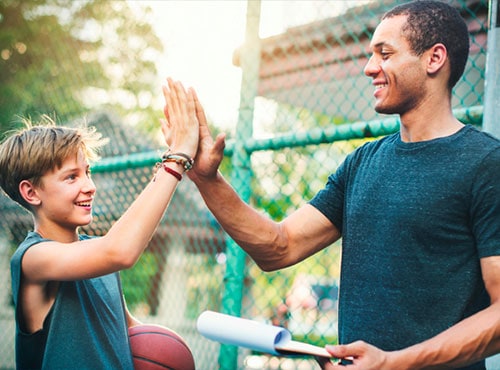
In my life, I wear many hats. Professionally, I am a trainer, consultant, and author for Boys Town. Personally, I am a father, husband and coach for youth sports. With each hat comes different responsibilities. But, there are parallels; especially in the areas of teaching and supporting children in their social-emotional growth.
Throughout my career, I have learned that one of the greatest challenges that our children face today is access to strong modeling in the area of skill development. Children today are inundated with negative messages through social media, the internet, and television. In addition, the social pressures kids are facing make it more and more difficult to learn how to regulate their emotions and deal with everyday adversity.
One of my most rewarding hats, outside of being a father, is coaching youth sports. Every child we encounter has a different set of skills and experiences that shape how they interact with adults and respond to coaching. Participating in sports gives youth the opportunity to experience many different types of challenges that translate into valuable life experiences, improving their overall skill set. Coaches have the unique opportunity to teach skills through these challenges. There are three common challenges that youth face when playing sports.
How to Accept and Implement Feedback
One of the primary jobs of a coach is to improve a child’s physical skills to help them be the best they can be at a given sport. However, each time you offer them advice - how to swing a bat, tackle a runner or kick a ball - they are being given feedback from an adult. Children have two options; they can accept or reject the feedback. Feedback is the child’s opportunity to improve. Their ability to accept this information from an authority figure is a life skill that will follow them throughout their lives. Some people refer to this skill as being coachable, but as children get older this translates into success in school and eventually in their jobs. As coaches, we can support this challenging skill by providing feedback in a calm manner, recognizing small changes in behavior, and allowing time to change.
For more resources on Accepting Feedback, check out Julia Cook’s Thanks for the Feedback (I Think).
How to Win and Lose
Winning and losing are part of any sport. However, how to win or lose is not typically a skill that children know intuitively. Many coaches think that losing is the only skill that kids need to learn. But, how to win with class is just as important. As coaches, we have the opportunity to model this behavior in every game. The children we coach take direction from our actions:
• Do we support the other team when they make a good play?
• Do we intentionally shake the other coaches' and players' hands?
• Do we lose control of our emotions after a tough loss or bad call?
These situations shape our youth to become both good winners and players who have the ability to overcome defeat.
For more resources on winning and losing, check out Bryan Smith’s If Winning Isn’t Everything, Why Do I Hate to Lose?
How to Regulate Your Emotions
Sports truly are the weight room for emotional regulation. Every time a child goes out to play a sport they experience highs and lows. Managing these situations is difficult under the best circumstances; add the stress of a game and that difficulty increases exponentially. As coaches, we can support the growth of this skill by being more proactive than reactive and understanding that stress is part of the game. We can never prepare our players for every situation, but we can them how to stay calm. These skills should be taught at neutral times, during practice, not during the game or immediately after the stressful situation. In addition, as coaches, we have to remain calm when our players lose their cool because we are modeling how to manage stress.
For more resources on staying calm, check out Stephie McCumbee’s Priscilla and the Perfect Storm.
Sports provide players with opportunities for skill development, both physical and social-emotional. Coaches have the opportunity to model and teach these skills. The skills that they learn while playing generalize outside of the playing field and help to produce better young adults who are able to deal with the adversity of everyday life.
